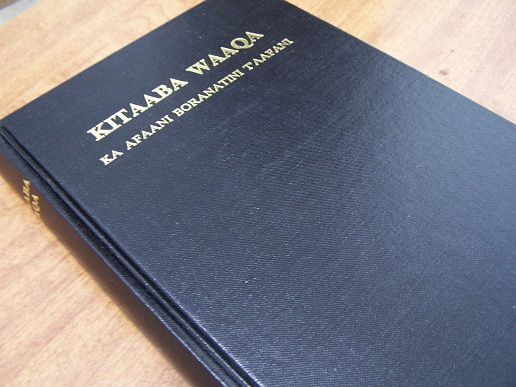KITAABA WAAQA: Borana Bible
KITAABA WAAQA is the Holy Bible translated into Borana, a Cushitic language spoken by the Borana people of East Africa. This culturally rooted edition delivers the complete Scriptures in clear, fluent Borana, making it ideal for native speakers, missionaries, and linguists. Whether you’re seeking spiritual growth or preserving linguistic heritage, this Bible brings the Word of God to life in a meaningful, native voice.
Ganna 1978 keesa Chamani Bibilia ka Kenya, Kkitaaba qara ka Wold’aqisa Haraa ka afaani Boranatini t’aafani gadi baase, Duuba eege gannuma iti aanu ka 1979 keesa huji gargalchiiti Wold’aqisa Dullachale, jala qabatani. Duuba eegi ammalle kitaaba kana ch’ufa gargalchani, kitaaba Wold’aqisa Haraale ira deebiani qajeelchani gargalchiiti kitaaba Wold’aqisa Dullachaatini wolfakeesani.
The Borana Oromo people, also called the Boran, are a subethnic section of the Oromo people who live in southern Ethiopia (Oromia) and northern Kenya. They speak a dialect of the Oromo language that is distinct enough that it is difficult for other Oromo speakers to understand. The Borana people are notable for their historic Gadda political system. They follow their traditional religions, or (Ethiopian Orthodox) Christianity and Islam.
Between the twelfth and fifteenth centuries, the Oromo people had differentiated into two major confederations of pastoral tribes: the Borana and the Barentu, and several minor ones. The Barentu people thereafter expanded to the eastern regions now called Hararghe, Arsi, Wello, and northeastern Shawa. The Borana people, empowered by their Gadda political and military organization, expanded in the other directions, regions now called western Shawa, Welega, Illubabor, Kaffa, Gamu Goffa, Sidamo, and thereafter into what is nowthe northern Kenya regions. The Borana are further subdivided into various subgroups such as Macha, Tulama, Sadacha, and others.
Categories
- Kenya Arabica Coffee (55)
- Kenya Tea (40)
- Bibles and Hymns (45)
- African Literature (4)
- Loose Tea Leaves (4)
- Tea Bags (14)
- Loose Tea (20)
- Ekegusii Bible (1)
- Machine Coffee Pods (3)
- Prayer Books (7)
- Whole Coffee Beans (3)
- Instant Coffee (17)
- Ground Coffee (32)
- Swahili Bibles (5)
- Life Experience (1)
- Faith and Religion (7)
- Culture & Politics (2)
- Dictionaries (2)
- World Literature (6)
- Decaffeinated Coffee (2)
Manufacturers
Bestsellers

















.png&w=64)



.png&w=64)






_tea_250g.png&w=64)






.png&w=64)


_Tea_250g.png&w=64)

















